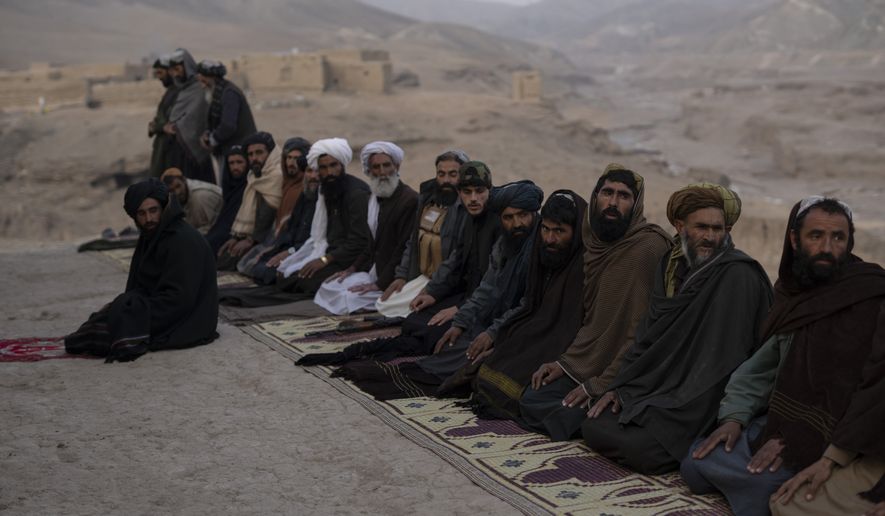Afghanistan’s Taliban leadership on Sunday rejected sharp criticism from the U.S. and a host of Western allies that the regime has embarked on a campaign of targeted killings of security officials linked to the ousted U.S.-backed government in Kabul.
The State Department, in a coordinated message with nearly two dozen European and Asian allies and the European Union, on Saturday condemned reported Taliban government killings and detainments without trial of more than 100 former police and intelligence officers in the four months since taking control of Afghanistan in a lightning offensive.
The Islamist movement’s leaders had pledged a general amnesty for members of the fallen government. They cited the amnesty as a key reason for the U.S. and other Western nations to lift economic sanctions and work with the Taliban government as its struggles with deep economic and humanitarian crises as the winter months begin.
Despite some links, Western powers have yet to engage fully with the Taliban. The State Department statement Saturday evening suggested that concessions such as diplomatic recognition remain far down the line.
The reported actions “constitute serious human rights abuses and contradict the Taliban’s announced amnesty,” the joint statement read. “We call on the Taliban to effectively enforce the amnesty for former members of the Afghan security forces and former government officials to ensure that it is upheld across the country and throughout their ranks.”
“We will continue to measure the Taliban by their actions,” the 22 nations said.
The watchdog group Human Rights Watch issued a Nov. 30 report detailing what it said was a systematic reprisal campaign. The report said many members of the former government were lured into the open by Taliban leadership promises that each applicant would be screened and given a letter guaranteeing their safety.
“However, the Taliban have used these screenings to detain and summarily execute or forcibly disappear individuals within days of their registration, leaving their bodies for their relatives or communities to find,” Human Rights Watch researchers wrote.
The watchdog group said its findings were based on personal interviews and phone calls with nearly 70 witnesses in four Afghan provinces.
“The Taliban’s unsupported claims that they will act to prevent abuses and hold abusers to account appears, so far, to be nothing more than a public relations stunt,” the report said.
A top Taliban official on Sunday rejected the charges and said the regime was presented with no evidence of unjust reprisals.
“We have had some individual cases of killings of ex-government members, but these were due to private enmity, and we’ve arrested those involved,” Afghan Interior Ministry spokesman Sayed Khosti said in a video statement, according to the Reuters news agency. “This is slander against the Islamic Emirate of Afghanistan, not justice.”
An interagency team of Biden administration diplomatic, aid and security officials met with Taliban representatives in Doha, Qatar, last week. The U.S. and other Western governments have conditioned diplomatic recognition on a sign that the new government respects civil liberties, women’s and minority rights, and avoids widespread revenge attacks on Afghans linked to the previous government.
The Taliban government was on the defensive on another front over the weekend as women’s rights groups largely panned a government decree banning forced marriages as far too little to protect women’s rights to education, employment and political participation.
The status of women in Taliban-ruled Afghanistan has become a closely watched barometer. The radical Islamist movement imposed harsh restrictions on women when it was in control in Kabul in the years before the U.S. invasion of 2001.
Currently, instruction beyond elementary school is banned for girls, and most jobs are reserved for men under interim rules as Afghanistan’s leaders scramble to define their new state.
Social rights activist Farida Akbari told The Associated Press on Sunday that the edict banning forced marriages would have little impact beyond the country’s rural areas and would do nothing to help women in the cities preserve the rights they have won in recent years.
According to the decree, the genders “should be equal,” and “no one can force women to marry by coercion or pressure.”
Women were allowed to keep the right to inheritance, and a widow would be allowed to marry the man of her choice 17 weeks after her husband’s death.
“It is not acceptable for us to get married, eat and stay at home,” Ms. Akbari told reporters in Kabul, according to the AP account. “We want our role in politics, economics, jobs, education and social activities where they can’t limit us.”
Blocking real employment and political opportunities “is tantamount to a denial of women in society,” she said.
• David R. Sands can be reached at dsands@washingtontimes.com.




Please read our comment policy before commenting.